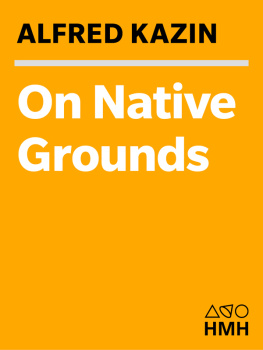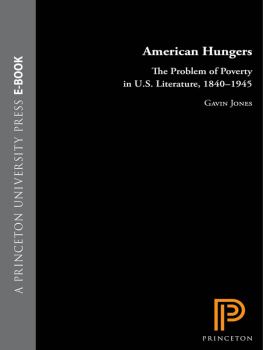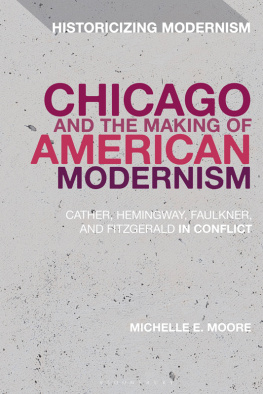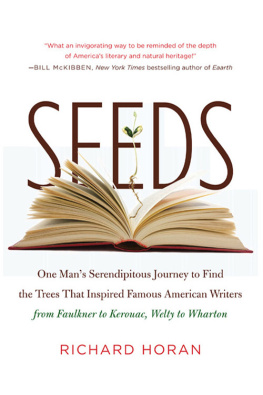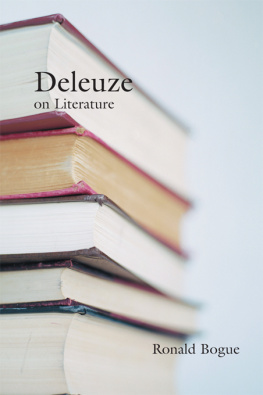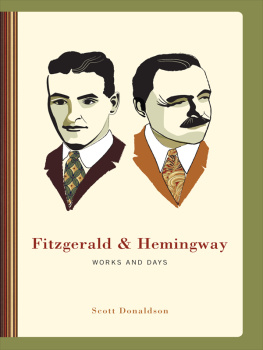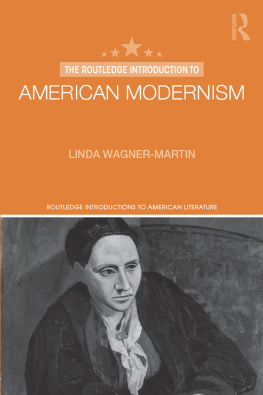Copyright 1942 by Alfred Kazin
Copyright renewed 1970 by Alfred Kazin
Copyright 1995, 1982 by Alfred Kazin
All rights reserved. No part of this publication may be reproduced or transmitted in any form or by any means, electronic or mechanical, including photocopy, recording, or any information storage and retrieval system, without permission in writing from the publisher.
For information about permission to reproduce selections from this book, write to Permissions, Houghton Mifflin Harcourt Publishing Company, 215 Park Avenue South, New York, New York 10003.
www.hmhbooks.com
The Library of Congress has cataloged the print edition as follows:
Kazin, Alfred, 1915
On native grounds: an interpretation of modern American prose literature/
by Alfred Kazin.3rd Harvest ed.
p. cm.(A Harvest book)
With a preface to the fiftieth anniversary edition.
ISBN 0-15-668750-X
1. American prose literature20th centuryHistory and criticism. 2. United StatesIntellectual life20th century. I. Title.
PS369.K39 1995
818'.50809dc20 94-45100
Permissions acknowledgments can be found on and constitute a continuation of the copyright page.
eISBN 978-0-544-26374-1
v1.0613
For
A SYA , G ITA, AND C HARLES K AZIN
IN LOVE AND HOMAGE
... sometimes the life seems dying out of all literature, and this enormous paper currency of Words is accepted instead. I suppose the evil may be cured by the rank-rabble party, the Jacksonism of the country, heedless of English and of all literaturea stone cut out of the ground without hands;they may root out the hollow dilettantism of our cultivation in the coarsest way, and the newborn may begin again to frame their own world with greater advantage.E MERSON , Journals
Preface to the Fiftieth Anniversary Edition
The joy of being tossd in the brave turmoil of these times.
W ALT W HITMAN , Democratic Vistas
I began On Native Grounds on a kitchen table in Brooklyn, 1938, and completed it in Long Island City, 1942, expecting a call from my draft board at any minute. The dates are essential to any understanding of the book, to its survival for over fifty years and its continued influence. There is no excitement for a writer like that of living in rebellious times. At least before World War II broke out, my work in progress was very much the product of and a response to the social crises of the 30s. The massive breakdown of the American economy in the depression was the greatest national crisis after the Civil War, and I lived in its very midst, tossed up and down in the stormy ocean of the times by the suffering of my unemployed working-class parents, the mass social protests all over the country, the triumph of Fascism in Germany, Italy, and Spain, and the extremism in America itself of Communist and Facist ideologies in violent conflict.
What Whitman wrote about the Civil War in Drum-Taps could have been said of the 30s:
Long, too long America,
Traveling roads all even and peaceful you learnd from joys and prosperity only,
But now, ah now, to learn from crises of anguish, advancing, grappling with direst fate and recoiling not,
And now to conceive and show to the world what your children enmasse really are...
A history of modern American prose literature begun in such a period and continued out of a sense of social crisis during the great global war against Fascism! The literary significance of this is that I believed in what William Hazlitt called the spirit of the agemeaning that this age we were living in had a character all its own and could be related to other ages and periods, thus constituting a historical scene in which a period was known through its writers and its writers through their period.
Of all my books, On Native Grounds was the easiest to write. I felt what I have never felt since 1945that the age was wholly with me, that I was appealing to the spirit of the age, that the writers as characters in my book were friends and the most encouraging people in the world to write about. I was writing literary history, a genre long abandoned by critics and now suspect (history can no longer be characterized and summed up as confidently as it was in the 30s and early 40s by the young man who wrote this book). This means that I saw connections everywhere between history and literaturebetween the populism of the 1890s and the realism in Howells, Dreiser, and Wharton; between the first expatriates in the 1890s and the alienation that led the Hemingway generation to what Henry James had earlier called the conquest of Europe. I saw connections between the writers themselves as fellow-spirits and artists relating to the pressures of American life.
My subject was the emergence of the modern in an American literature obviously unsettled by relentless new forces in every sphere: social, intellectual, and religious. My perspective, so natural in the turbulent 30s, was based on a spirit of social protest I shared with almost every writer in my book, from William Dean Howells, whose move in 1891 from Boston to New York opened my narrative, to the Southern Agrarians (Allen Tate and John Crowe Ransom the best known), who in 1938 still thought it possible to create a preindustrial society on the pre-Jeffersonian model.
There was nothing strange or unexpected in 1938 about my being both critical of the system and crazy about the country. What drew me to the serious study of American literature within a historical context was the narrative it suggested on every hand. America from its beginnings as our rising empire (Washington) embodied a purposeful form of historical movement, unprecedented on such a continental scale, that cried out to be written as a great story. In the background of the particular story I was writing was the sense, which was everywhere at the end of the nineteenth century, of a new age. What struck me from the first was the astonishment with which American writers confronted situations as new to themselves as to the Europeans who were often reading about America for the first time.
What gave me the confidence at twenty-three to begin a book like this? The age, the insurgency of the times, but above all On Native Grounds represents my personal discovery of America. The first native son in my immigrant family, brought up in a Brooklyn ghetto by parents whose harshly enclosed lives never gave them a chance even to learn English, I was crazy about the America I knew only through books. And it was such an idealistic, radically Protestant America, defined by its purest spirits, from Audubon and Jefferson to Emerson and Thoreau, to the Lincoln who had saved the Union, to the great democrats of philosophy John Dewey and William James, and to the Willa Cather, Theodore Dreiser, Sherwood Anderson, and Carl Sandburg who brought home the Middle West to me as the valley of democracy and the fountainhead of hope.
There are critical judgments in my book I have long been dissatisfied with. Howells was a realist of great sensitivity and a historically significant novelist, but hardly a great one. I made him altogether too loveable by signifying his instinct for changes in the literary weather and his old-fashioned sense of outrage at the depredations of the iron age in American capitalism.
I was still afraid of Faulkner when I wrote about him in the limiting terms then so conventionally used in discussions about this great artist. My sensitivity to Faulkners passionand it is a historical passion both as subject and achievementwas so acute that my style became equally extravagant; I unconsciously imitated a style I pompously disapproved of! Since then, in one essay and book after another, I have written in full appreciation of a man I believe to be the greatest of twentieth-century American noveliststhe only modern equal to Melville in narrative intensity and philosophic force.
Next page
